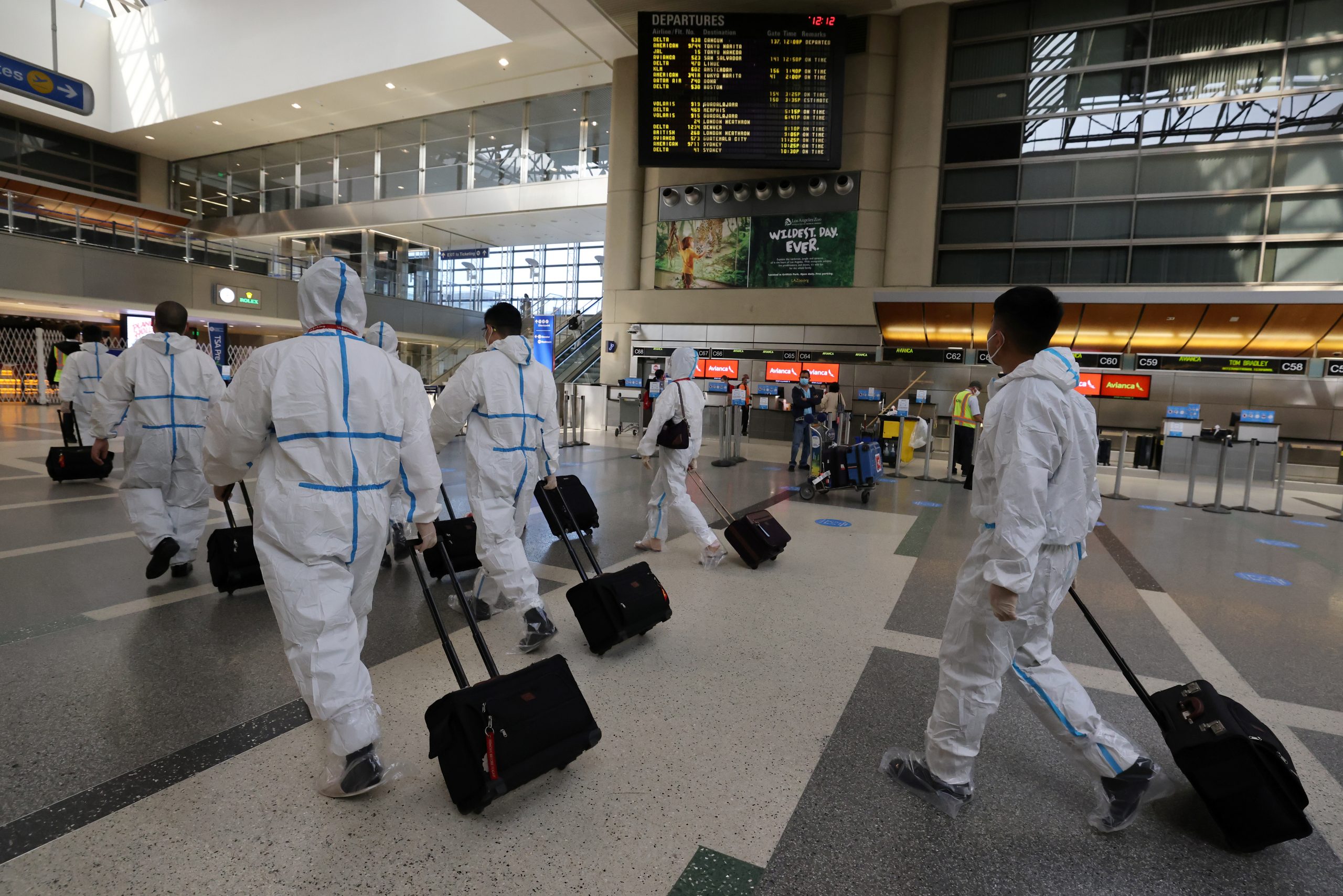Millions of Americans appeared to be disregarding public health warnings and traveling ahead of the Thanksgiving holiday, likely fueling an alarming surge in coronavirus infections before a series of promising new vaccines are expected to become widely available.
Although fewer in number than last year, U.S. travelers were flocking to airports and highways against the advice of the Centers for Disease Control and Prevention (CDC), the U.S. surgeon general and Dr. Anthony Fauci, the nation’s top infectious disease expert.
As U.S. infections of the highly contagious respiratory virus continued to spread swiftly, hitting a new record of 168,000 new cases per day on average, many travelers expressed equal parts of determination and dread.
“I’m really scared, but seeing family is very important to me,” Hannah Osnan, 18, a California State University Long Beach student waiting in line for a COVID-19 diagnostic test at Los Angeles International Airport, where she hoped to board a 22-hour flight to see family in Egypt for the first time in a year.
The long Thanksgiving holiday weekend, which begins on Thursday, is traditionally the busiest U.S. travel period of the year, and 2020 may prove to be no exception.
Some 1 million passengers passed through airport security gates on Sunday, the highest number since March. It was the second time in three days U.S. air travel screenings surpassed 1 million, though the numbers are down nearly 60% from the same time last year, the U.S. Transportation Security Administration said.
Likewise, the American Automobile Association has forecast that 45 million to 50 million people will take to the highways over the holiday, compared with 55 million in 2019.
At the same time, rates of coronavirus infections, deaths and hospitalizations are soaring.
The seven-day rolling average number of U.S. COVID-19 deaths climbed for a 12th straight day, reaching 1,500 as of Monday, according to a Reuters tally of official data, and coronavirus hospitalizations nationally have surged nearly 50% over the past two weeks. (Graphic: https://tmsnrt.rs/34pvUyi)
To date, COVID-19 has killed more than 257,000 Americans, with over 12 million testing positive since the pandemic began.
State and local government officials have reimposed a host of restrictions on social and economic life in recent weeks to tamp down the spread, as medical experts warn the surge is threatening to overwhelm hospitals already strained by rising caseloads.
VACCINE HOPE ON HORIZON
The dire scope of the crisis has been tempered by promising news on the vaccine front.
The head of the U.S. campaign to rapidly deploy a vaccine said on Sunday the first shots could begin to be administered to healthcare workers and other high-priority recipients as early as mid-December, within a day or two of receiving regulatory consent.
Nevertheless, health authorities have urged Americans to resist letting their guard down, warning it will likely take several months for sufficient quantities of vaccine to be widely available.
A vaccine from Pfizer Inc and its German partner BioNTech is expected to win authorization from the U.S. Food and Drug Administration next month, with a second vaccine from Moderna Inc headed for FDA review before year’s end.
Late-stage trials of both vaccines have been about 95% effective in preventing infection. The British maker of a third vaccine, AstraZeneca, announced Monday its candidate has proven 90% effective without serious side effects, and that 700 million doses could be ready globally by late in the first quarter of 2021.
Still, the imperatives of family and fatigue with COVID-19 restrictions have left many Americans defying health advice that could save their lives.
“We are not going to let COVID scare us,” said Brian McDonough, 47, a construction worker and diligent mask wearer who plans to spend Thanksgiving with his sister not far from his home in Worth, Illinois. He will bring pies for dessert.
“We get tested, we are negative, so life goes on,” he said. “Thanksgiving is Thanksgiving. Christmas is Christmas. New Year’s is New Year’s. If people die it’s going to happen, and there’s nothing we can do about it until we get a vaccine.”
Edie Taylor, 29, a building design specialist in Oakland, California, was less sanguine as she prepared to board a flight to her hometown of Birmingham, Alabama, to attend a family gathering and then stay on through New Year’s.
“It’s terrifying,” said Taylor, who said she would have changed her plans in light of the worsening pandemic, but after giving up her apartment in Oakland “I didn’t have anywhere to live. I just have to get on that plane.”
To be sure, many Americans are exercising greater caution.
Donnalie Hope, 78, of Petersburg, West Virginia, is planning to make fresh cranberries, mash potatoes and her famous corn pudding for Thanksgiving, which she will spend with her visiting daughter and a neighbor.
Hope said they would try to social distance in her home, and she planned to have rubber gloves and hand sanitizer on hand. She acknowledged her guests might take off their masks in the home.
“I’m trying very hard to comply with the regs because I want this country to get back to where it belongs,” Hope said.
(Reporting by Daniel Trotta and Nathan Layne; Additional reporting by Lisa Lambert, David Shepardson and Susan Heavey in Washington, Barbara Goldberg in Maplewood, New Jersey, and Lucy Nicholson in Los Angeles; Writing by Daniel Trotta, Maria Caspani and Steve Gorman; Editing by Lisa Shumaker and Bill Tarrant)
























